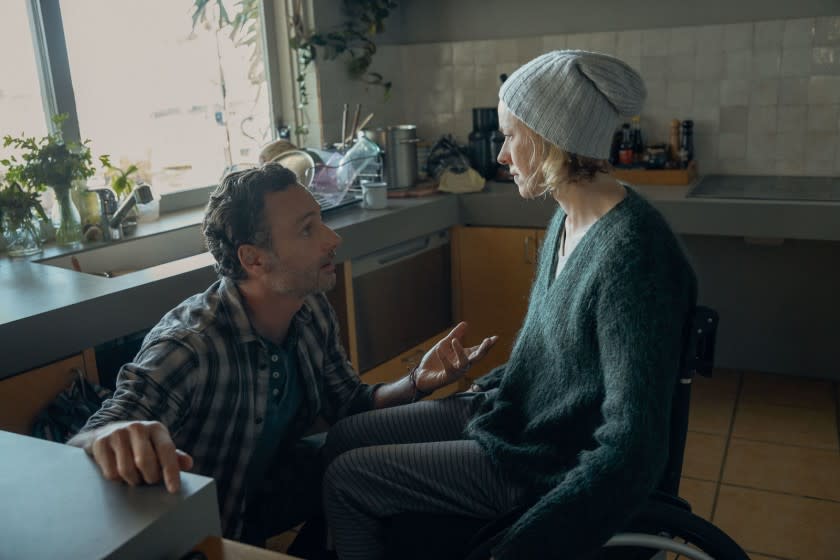Review: A bird inspires Naomi Watts in family drama 'Penguin Bloom'

“Penguin Bloom” is the second true-life trauma drama to drop within the week. Although it’s not as layered or sweeping as Friday’s fine feature release “Our Friend,” it’s a touching and inspiring, if often painful, look at a family dealing with the aftermath of a singular tragic event.
In 2013, Samantha “Sam” Bloom (Naomi Watts), while vacationing in Thailand with her husband, Cameron (Andrew Lincoln), and three young sons, accidentally plunged off a rooftop when a rotted wooden guard rail gave way. It left the vibrant, athletic Bloom paralyzed from the chest down, forced to rebuild her life back in her native Australia despite severe physical limitations and crushing depression. Then an unexpected visitor changed everything.
Shaun Grant and Harry Cripps lovingly adapted the 2016 book by Cameron Bloom and Bradley Trevor Greive to tell this vivid story of Sam’s remarkable renewal that was due, at least in part, to the presence of an injured magpie chick rescued by eldest Bloom son Noah (Griffin Murray-Johnston) — the film’s narrator — and nursed back to health by the family.
There’s no shortage of metaphorical parallels between the wild black-and-white bird, which Noah named Penguin, and the disabled Sam. Not the least of these: The magpie must learn to fly again and the once-ebullient Sam must find a way to, well, soar once more. If that feels rather on-the-beak, sometimes truth is stranger than fiction.
When we meet Sam post-accident, in her home on Sydney’s Northern Beaches (the film was shot in the actual Bloom family’s bright seaside house), she is understandably mired in anger, frustration and self-pity. Unsure what her place is now in the lives of the attentive if overwhelmed Cameron and their growing, energetic sons, the former nurse retreats from friends and family, including her hovering mom (Jacki Weaver) and, some days, can barely get out of bed.
So it’s no surprise that Sam has little patience for Penguin when Noah brings her home and, thus, makes it clear that the screechy bird can’t stay with them for long. That is, until Sam is left in charge of Penguin one day and finds herself drawn to — and soon bonding with — the endearing creature.
As “Peng” becomes part of the family, she proves the catalyst that begins to brighten Sam’s outlook and bring the Blooms closer again. And, though the bird wreaks a bit of havoc, there are thankfully few “magpies do crazy things” shenanigans. (Shout-out to bird trainer Paul Mander.)
Another result is that, encouraged by Cameron, Sam tentatively embarks on a series of kayaking lessons under the tutelage of the tough-love (emphasis on love) Gaye (Rachel House). Mastering the sport becomes a lifeline and game-changer for Sam, who, in real life, went on to compete in the World Kayaking Championships and later won two World Adaptive Surfing titles.
The kayaking scenes give director Glendyn Ivin and cinematographer Sam Chiplin added opportunity to capture the area’s dazzling scenery, which they do beautifully throughout this coastal-set film. Marcelo Zarvos’ warm, strings-heavy score provides lovely support.
Aided by its deft performances, the film manages its tricky emotional territory with aplomb, rarely dipping into sentimentality or easy conciliations. This proves especially true — and rewarding — when Sam must finally confront the sensitive Noah, who thinks he’s to blame for his mother’s accident (he had brought her to the spot where she fell).
Watts, also a producer here, brings a powerful dose of grit and despair, as well as poignant longing and hope, to her difficult role. Moments of Sam’s torturous physical exertion and wit’s-end lashing out may be tough to watch, but they lend a stark reality to the film and make its more cathartic parts particularly well earned. That late-breaking scene by the lighthouse: Get out your handkerchiefs.
This story originally appeared in Los Angeles Times.

 Yahoo Movies
Yahoo Movies 
